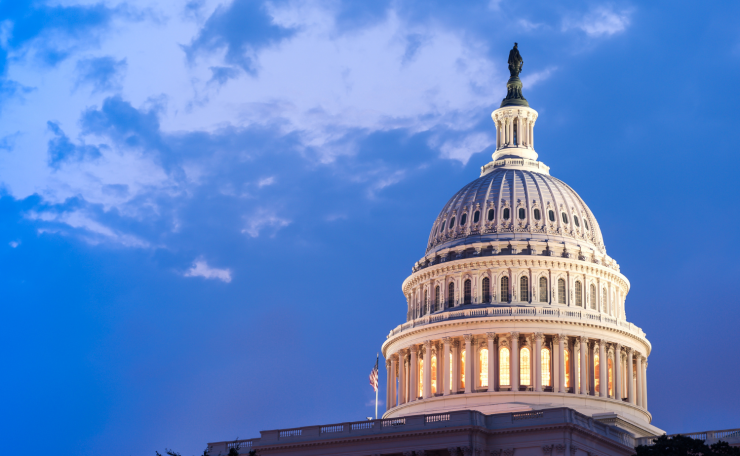United States lawmakers achieved a watershed moment for digital assets on Thursday, July 17, 2025, when the House of Representatives passed the Guiding and Establishing National Innovation for U.S. Stablecoins (GENIUS) Act. The landmark bill cleared the chamber with a resounding 308-122 vote and now awaits President Trump’s signature.
Political drama nearly derailed what House leaders had dubbed “Crypto Week.” Right-wing Republicans stalled the legislation earlier in the week, forcing President Trump to intervene directly to secure the necessary votes. These events highlighted both the political complexities surrounding digital asset regulation and the growing influence of the cryptocurrency lobby, which invested over $100 million in Congressional races last year.
The GENIUS Act marks a fundamental shift in American cryptocurrency regulation. Federal guardrails will now govern the $238 billion stablecoin market while potentially cementing the dollar’s dominance in digital finance. Treasury Secretary Scott Bessent told lawmakers that the U.S. stablecoin market could grow nearly eightfold to over $2 trillion in the coming years.
Framework for a Digital Dollar Economy
Stablecoins occupy a unique position in the cryptocurrency ecosystem. These digital assets peg their value to traditional currencies like the U.S. dollar, offering more stability than volatile tokens such as Bitcoin. The GENIUS Act creates comprehensive rules requiring companies that sell stablecoins to maintain equivalent dollar reserves, ensuring users can redeem their digital holdings for actual currency.
Key provisions include:
- Full reserve backing maintained on a 1-to-1 basis with U.S. dollars
- Monthly audits conducted by registered public accounting firms
- Compliance with anti-money laundering regulations
- Priority repayment for coin holders in bankruptcy proceedings
- Restrictions on rehypothecation of reserve assets
These measures aim to prevent catastrophic collapses like the $60 billion Terra Luna stablecoin implosion in 2022.
Senator Kirsten Gillibrand, D-N.Y., one of the bill’s sponsors, emphasized the legislation’s dual purpose: “The GENIUS Act will protect consumers, enable responsible innovation, and safeguard the dominance of the U.S. dollar.”
Banking Meets Blockchain
Traditional financial institutions gained new opportunities to enter the stablecoin market through carefully crafted provisions. JPMorgan Chase has already launched JPMD, a deposit token functioning like a stablecoin but tightly integrated with traditional banking systems.
Competitive safeguards prevent monopolistic behavior. Large technology companies cannot directly issue stablecoins unless they establish or partner with regulated financial entities, addressing concerns about Big Tech’s potential dominance in digital payments. Bezalel Eithan Raviv, CEO of blockchain security firm Lionsgate Network, views the legislation pragmatically: “It’s a step in the right direction for everyone. There are ways to make it better. There are ways to make everything better. But this is the first one.”
Political Drama and Presidential Interests
Conservative Republicans initially threatened to derail the legislation by attempting to bundle the GENIUS Act with other crypto bills, including measures preventing the Federal Reserve from issuing a central bank digital currency. The standoff required direct presidential intervention, with Trump ultimately announcing that lawmakers “have all agreed” to fall in line.
Critics raised concerns about potential conflicts of interest given President Trump’s family’s significant cryptocurrency ventures. World Liberty Financial, backed by the Trump family, issued its own stablecoin called USD1, positioning the president’s business interests to potentially benefit from the new regulatory framework.
Senator Elizabeth Warren led opposition voices, while Senator Jeff Merkley, D-Ore., accused Republicans of “rubberstamping Trump’s crypto corruption” and allowing the president to sell “access to the government for personal profit.” The final legislation includes language prohibiting members of Congress or senior executive branch officials from issuing payment stablecoin products during their time in public service. Critics argue this inadequately addresses concerns about existing ventures.
Industry Transformation Ahead
Mainstream finance faces significant changes following the GENIUS Act’s passage.
Nic Puckrin, crypto analyst and founder of The Coin Bureau, predicts widespread adoption: “We’ll likely see stablecoins increasingly adopted as a digital alternative to the U.S. dollar, so banks, fintechs and merchants will be forced to offer stablecoin payment options.”
Expected market changes include:
- Payment networks like Visa and Mastercard integrating stablecoin options
- Reduced transaction fees for consumers and businesses
- Faster and cheaper cross-border payments
- Enhanced options for international trade and remittances
- New competition between traditional banks and fintech companies
Emerging markets particularly stand to benefit. Puckrin notes that “Stablecoins are also being used increasingly in emerging markets, like Latin America and Sub-Saharan Africa, to hedge against monetary instability, as well as for cheap cross-border payments.” Global adoption could strengthen the dollar’s international position at a time when its dominance faces challenges from competing currencies and economic blocs.
Next Steps for Digital Asset Regulation
While the GENIUS Act marks a significant milestone, comprehensive crypto regulation remains incomplete. David Sacks, the White House’s crypto czar, urges the Senate to pass legislation establishing comprehensive rules for the cryptocurrency industry by September’s end. House lawmakers continue considering the CLARITY Act, which would establish broader market structure rules determining when digital assets qualify as commodities or securities.
That legislation faces an uncertain path. Senate Banking Chair Tim Scott, R-S.C., works on a potentially different Senate version. Financial institutions, technology companies, and regulators must now navigate the new framework while balancing innovation with consumer protection.
Implementation work begins immediately, with Treasury Secretary Bessent granted sweeping authority to oversee the stablecoin market’s expansion. Corey Frayer, director of consumer protection for the Consumer Federation of America, offered a stark assessment of the industry’s political influence: “This is what political power can buy you.” He warned that crypto’s war chest helps win supporters while silencing potential opponents who “are just plain scared that crypto is going to come to their town and spend enormous amounts of money against them.”
The GENIUS Act may have passed, but America’s financial system transformation has just begun.

